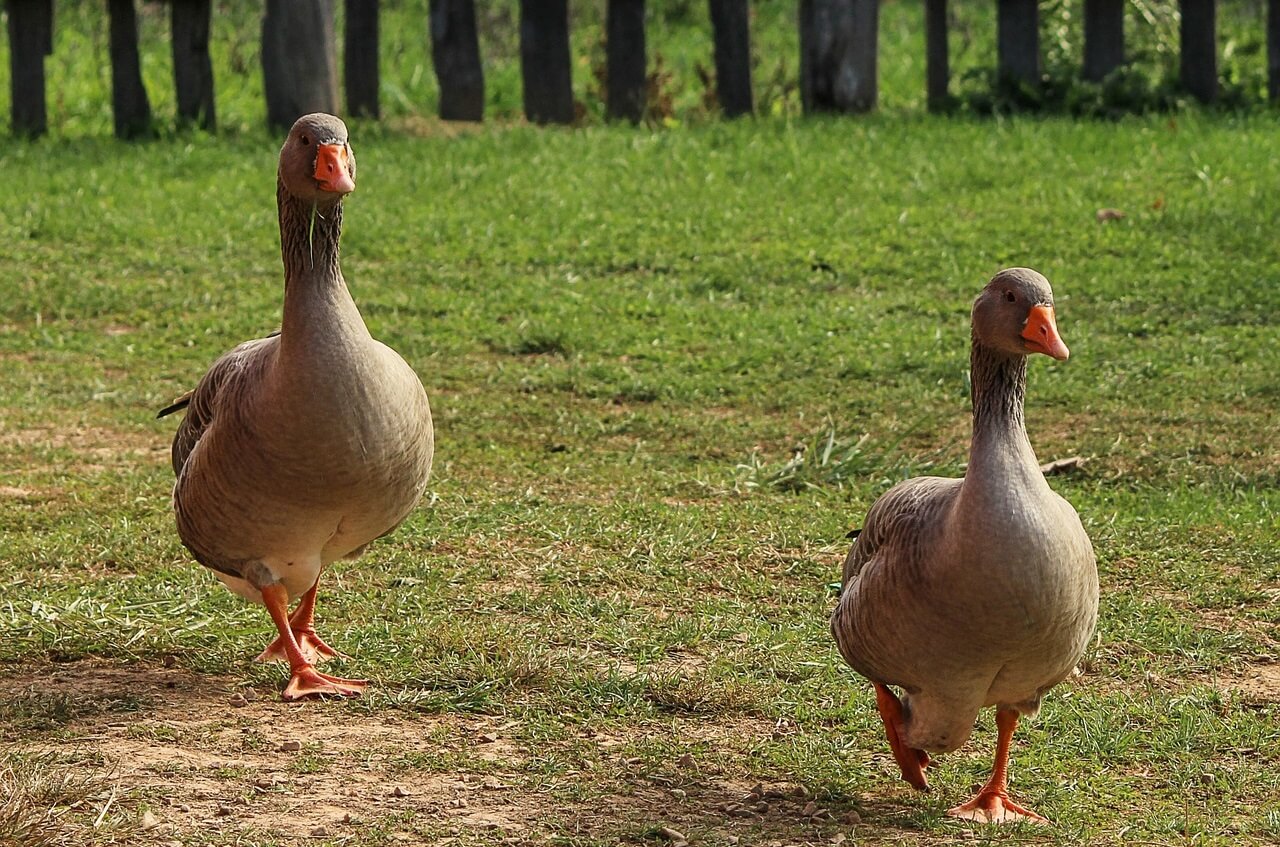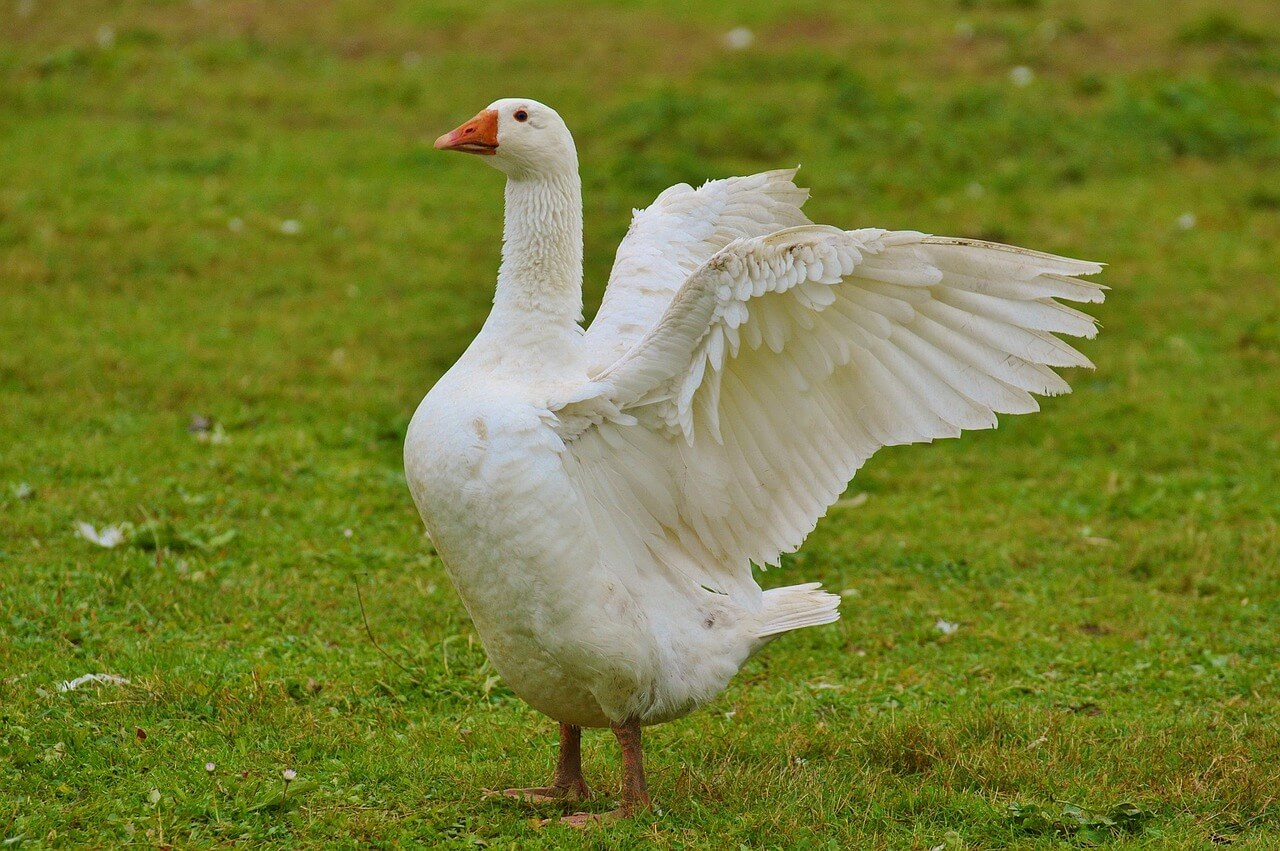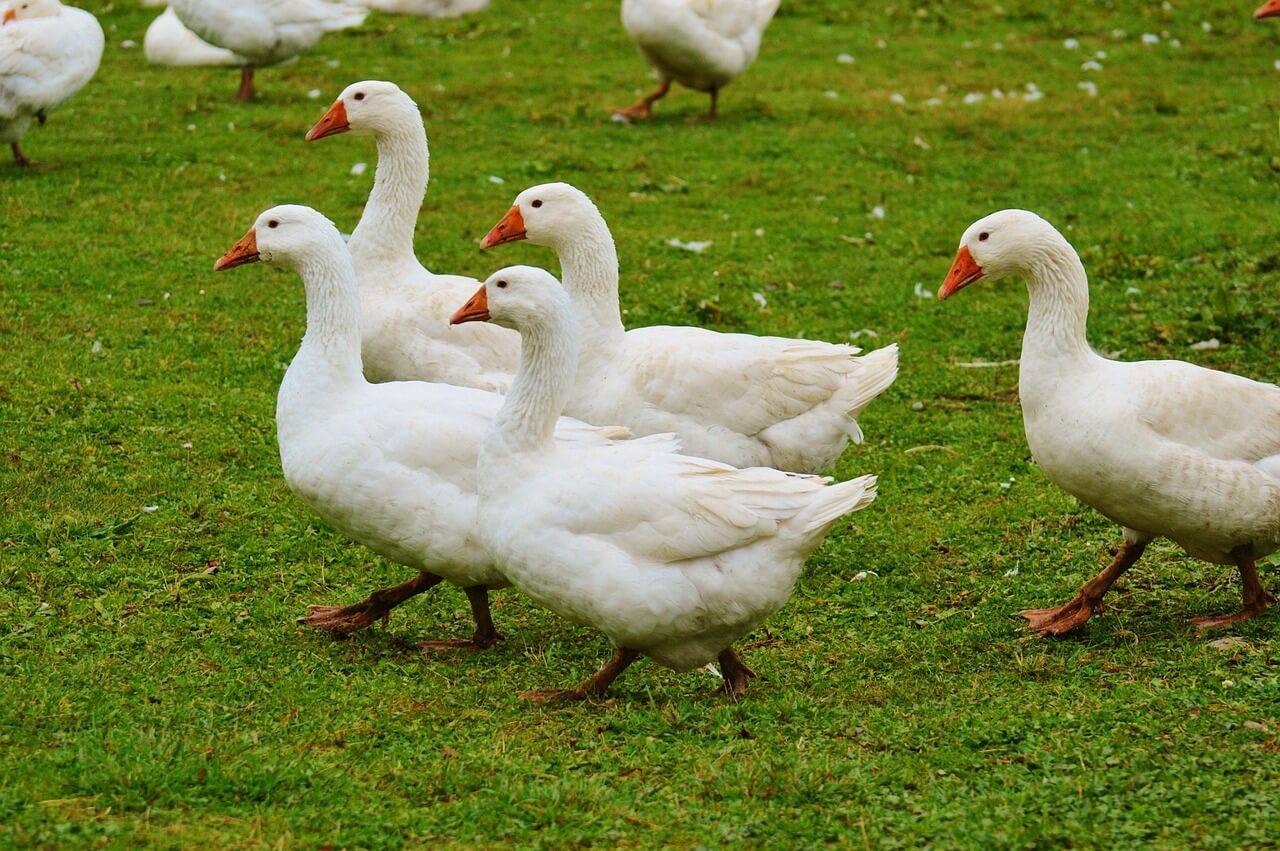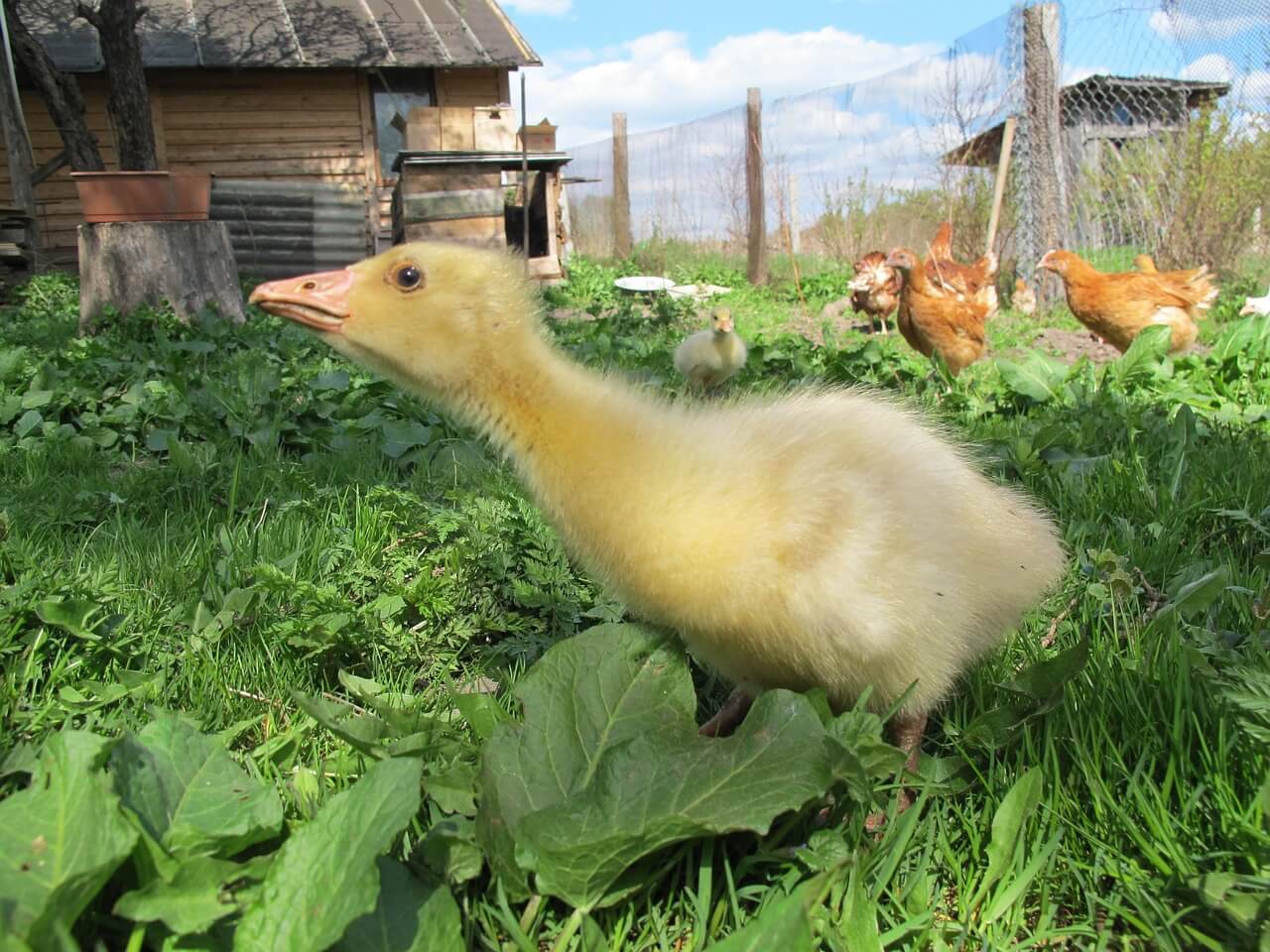Geese are naturally herbivores eating only plants. They are grazers, enjoying short green grass and plants such as clover and dandelions. By understanding what does a goose eat to keep it healthy, you can make a well-informed decision about feeding them in captivity. Learn what geese can and can’t eat by reading our article below.
What You'll Learn Today
What Do Geese Need in their Diet?

Geese have specific nutritional requirements just like other animals. Care must be taken or they may become too fat and that can be detrimental to health.
Although they are similar to ducks, being waterfowl, there are some definite differences when it comes to food.
Ducks are omnivorous and eat plants, grains, insects, and meat just like chickens do. Geese, in contrast, are entirely herbivores by nature.
Many commercial feeds are designed for ducks and geese, but it’s better to avoid the ones that have animal products or fish meal added if you want to feed your geese properly.
Some geese are still filter feeders like ducks, but most have evolved to exist on a diet of grass, leaves, roots, and other plants, and their beaks have adapted accordingly.
The required constituents of a gooses diet include:
Protein and Amino Acids
The amino acids contained in protein are necessary for geese to build feathers and muscle.
Some amino acids known as “essential amino acids,” cannot be produced by the bird and must be contained in their diet. This means it’s vital to ensure these are available in the food the goose is eating. Non-essential amino acids are synthesised by the goose’s body.
The amino acid content varies from one commercial feed manufacturer to the next, depending on how it’s created.
Offering your geese some scratch grain can be beneficial for several reasons. Grains contain vitamin E, B, and Phosphorus and also give the birds a fun time scratching around for them, encouraging natural behavior.
Scratch grain is not nutritionally complete and should make up only 10% of the birds’ food intake each day.
Overfeeding scratch grain can mean that excess is left on the ground. There are two problems with this, firstly it attracts vermin such as rats and mice, and secondly, if it becomes damp and moldy, it can cause your geese significant health problems and even kill them if they eat it.
Fresh Grass
By nature, geese are grazers and, like other herbivores, get much of their nutrition from eating grasses and other plants.
Certain types of grass and weeds are more beneficial to geese than others. They enjoy:
- Clover
- Timothy
- Bluegrass
- Orchardgrass
- Bromegrass
- And other soft grasses
Some plants grown for cattle, such as alfalfa, are not especially liked as they are too tough.
Plants are essential to geese to provide them with vitamins and minerals and help provide a healthy immune system.
You can also feed geese healthy green snacks, which you’ll discover in our list of “what do I feed a goose” below.
Grit
Just like chickens, geese need insoluble grit in the form of small hard rocks to help them digest food.
Geese don’t have any teeth, so to break down the tough foods they eat, they have an internal organ called a gizzard. This is very strong, and muscular. The grit works by helping to grind the food down inside the gizzard.
It is best to provide your geese with free access to a bowl of grit so they can take it when needed. Birds of different ages require a different size of grit; goslings need nothing more than coarse sand.
Insufficient grit can cause digestive problems and may lead to an impacted crop.
Niacin
Niacin (vitamin B3) is required by geese, especially goslings, to grow strong bones and joints. Insufficient niacin can result in deformities and various other problems.
Ensure that the feed you choose for your birds contains enough niacin. This is a standard ingredient in waterfowl formulas. Chicken feed is not high enough in this vitamin for geese.
Calcium and Vitamin A
If your geese have access to plenty of green foods, they should be able to get sufficient calcium and vitamin A naturally in their diet.
The best way of checking this is by keeping a close watch on their eggs. If the shells are soft, then a calcium supplement may be required.
It’s a good idea to check with a veterinary surgeon about this, as soft eggshells can also have other causes.
Vitamin D
Just like us, geese normally synthesize vitamin D from sun exposure. If you live in an area with very little sunshine, then additional vitamin D needs to be fed.
Vitamin D3 is the particular form necessary, and Kelp, a type of seaweed, is a popular supplemental source.
Insufficient vitamin D can also result in weak bones and soft eggshells, as can a lack of calcium or phosphorous.
Water
Being waterfowl, geese not only require water to bathe and swim in, but they also need it to drink. Ensuring a plentiful supply of fresh, clean water is available at all times is essential to the health of your birds.
Geese are pretty fussy and don’t like to drink dirty water. To keep the water clean, you can use a poultry fountain and a container large enough for the geese to bathe.
Don’t forget that water often freezes during the colder winter months, so it may need to be placed in a barn or have a special water heater.
Water is vital to stop your geese from choking on their food and to help keep their nostrils (nares) clean.
What Do I Feed a Goose?

Pasture provides a large part of a goose’s diet during the warmer months. The grass is best kept cut short in spring and fall, but during summer it’s sometimes preferable to let some areas grow longer.
The reason for allowing grass to grow long in summer is because if you cut it short, it gets burned by the sun and dies. Leaving it long keeps the shorter grasses that grow in between the longer ones green for longer.
Commercial chicken feeds offer a wide choice of brands, but this isn’t the case with food made specifically for geese.
Pelleted waterfowl feed is usually quite readily available and is suitable as a complete food for geese. It shouldn’t contain any animal byproducts such as fish meal and must be free of antibiotics or added hormones. Read the label carefully.
Although geese do require the same nutrients as chickens, they need them in different ratios. This renders chicken food unsuitable for your geese.
If your local feed store doesn’t carry any suitable feed, ask them to order it for you, or you can purchase it from an online retailer.
Age-appropriate feed
It is imperative to feed the correct type of feed for the age and job of the bird. A starter feed needs to be used for young goslings, while layer pellets are what’s required by geese laying eggs, as they have a higher calcium content.
If in any doubt, get advice about what feed is right for your birds from a veterinarian or from your feed store if they have someone suitably knowledgeable.
Winter Feeding
In this video, a farmer talks about how he sprouts grain in winter to feed his geese when there is no grass to graze:
Geese also enjoy an occasional treat, providing they only make up a small proportion of their diet. Fat geese are not healthy geese! Find out what they can and can’t eat below.
What Can Geese Eat?
In addition to their pasture and commercial feed rations, you can also give some treats to your geese. This offers their diet more variety, providing different nutrients, and also makes it more interesting for them.
A word of warning about geese, they are notoriously fussy eaters! Often an adult goose won’t eat things it doesn’t recognize. Then again, some will have a go at anything!
Vegetables
- Broccoli
- Cooked Beans
- Corn
- Cucumbers
- Kale
- Lettuce – except iceberg, which has no nutritional value and may cause diarrhea
- Peas
- Pumpkin
- Pumpkin seeds
Fruits
- Apples sliced – no core or seeds
- Bananas
- Berries – blueberries, blackberries, raspberries, and strawberries
- Cantaloupe
- Grapes – best if chopped first
- Watermelon
Grains & Seeds
- Black sunflower seeds – not all geese will eat sunflower seeds
- Cracked corn
- Oatmeal
- Wheat
Supplements
Some plants have beneficial effects on geese when added to their diets in small amounts:
- Flaxseeds – anti-inflammatory
- Garlic (powdered or chopped) – natural de-wormer
- Pumpkin seeds – natural de-wormer
- Turmeric – anti-inflammatory
If you have a sick or injured goose, it is better to consult a veterinarian rather than just relying on home remedies.
What Should You Not Feed Geese?

Never give geese food that has any mold on it. Mold has toxins that can cause serious health issues and even death.
It is also important to ensure you don’t feed anything that has been sprayed with herbicides or pesticides. This includes land where your geese graze.
Foods that should not be fed to geese:
- Avocado – contains the toxin persin
- Beans – Dried, raw (fine if sprouted), bean plants – contains toxin phytohemagglutinin
- Chocolate – contains the toxin theobromine
- Citrus – although most birds won’t eat it, it may interfere with calcium absorption
- Coffee or tea – contains caffeine and is dangerous for geese
- Eggplant – contains the toxin solanine
- Green potatoes – contains the toxin solanine
- Green tomato and tomato leaves – contains the toxin solanine
- Iceberg lettuce – no nutritional value and can cause diarrhea in large amounts
- Nuts – raw peanuts, hazelnuts, walnuts, and pecans – may inhibit protein absorption
- Onions – contains the toxin thiosulphate
- Pepper plants – contain the toxin solanine
- Processed human foods – contain too much grease, salt, and sugar
- Rhubarb – contains oxalic acid, which can lead to soft-shelled eggs. The leaves are toxic.
- Seeds or pits of apple, pear, apricot, cherry, peach, plum – contains cyanide
- Spinach – contains oxalic acid, which interferes with calcium absorption
- White potatoes – all parts of the plant contain the toxin solanine
Toxic Plants
As well as foods that humans eat that are toxic to geese, there are also many commonly found garden plants, shrubs, and trees that are too, these include:
- Avocado
- Azalea
- Beans – castor, fava, navy, and scarlet runner beans
- Bird of Paradise
- Bleeding Heart
- Burdock
- Buttercup
- Cardinal Flower
- Clematis
- Coriander
- Daffodils
- Datura – Angels Trumpet
- Delphinium
- Dieffenbachia
- Elderberry
- English Ivy
- Four ‘o’Clock
- Foxglove
- Heliotrope
- Hemlock
- Holly
- Honeysuckle
- Horse Chestnut
- Hyacinth
- Ivy
- Jerusalem Cherry
- Juniper
- Larkspur
- Lilies
- Lily of the Valley
- Lupine
- Milkweed
- Mistletoe
- Mock Orange
- Monkshood
- Morning Glory
- Mushrooms – not all, but some
- Nightshade
- Oak
- Parsley
- Potato plants
- Rhubarb
- Sorghum Grasses
- Tobacco
- Tulips
- Weeping Yew
Although many of these plant geese won’t usually touch, it is always better to exercise caution.
What Do You Feed a Baby Goose?

A waterfowl starter feed is the correct food to feed goslings. It contains around 20% protein. If your local supplier doesn’t stock it, it will be best to check before you need it and order it in or buy online if necessary.
From four weeks of age, goslings can be transitioned onto a grower feed that is lower in protein. Typically between 14 to 15%. You can also begin giving a small amount of scratch feed, and chopped greens.
Don’t forget to give an appropriately sized grit to help your goslings digest their food correctly.
At 20 weeks of age, move your young birds onto an adult feed.
Never give a layer feed to goslings as the high calcium content can make them very sick and even die.
If an unbalanced diet is fed to goslings, they may get a condition known as Angel Wing, which causes their flight feathers to twist. If caught early enough, this can be reversed with the correct treatment.
How Often Do Geese Eat?
In nature, wild geese spend the night on the water, then fly to fields to eat in the early morning, returning to the water in the late afternoon before they roost for the night.
Domestic geese will browse on and off throughout the day. They don’t usually eat at night but roost like other birds. For their own protection, they should be shut into a secure building to keep them safe from predators.
A handy way of getting your geese to come in for the evening is to feed them in their house a little before dark. That way, you won’t end up chasing them around the fields at night.
They are intelligent birds and quickly become familiar with a routine.
Conclusion
Geese enjoy eating various grasses, roots, seeds, leaves, stems, berries, and bulbs.
Domesticated geese are best kept with free daily access to a good quality pasture or meadow, fresh water to drink and bathe in, and ad-lib commercial feed and grit. Don’t leave food down overnight as it may attract rats.
During the winter months, a little additional scratch grain can be fed to help maintain weight.
Placing a few treats into water feeders can help add variety and entertainment for your geese, even young ones. It also helps stop rats from getting them.
By feeding your geese appropriate foods they should stay fit and healthy, providing you with a plentiful supply of eggs, young, and meat.
There are a variety of other articles about geese care available on our site.
I eat lettuce or any kind of lettuce leaf kind of salad stuff like that